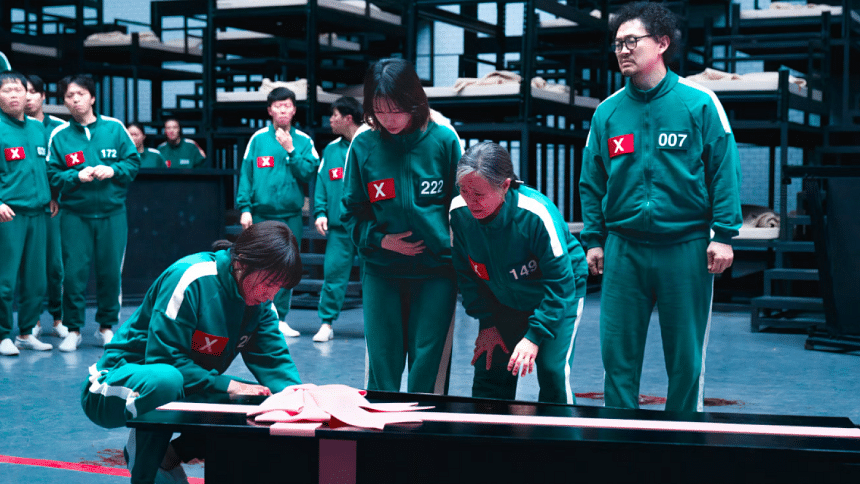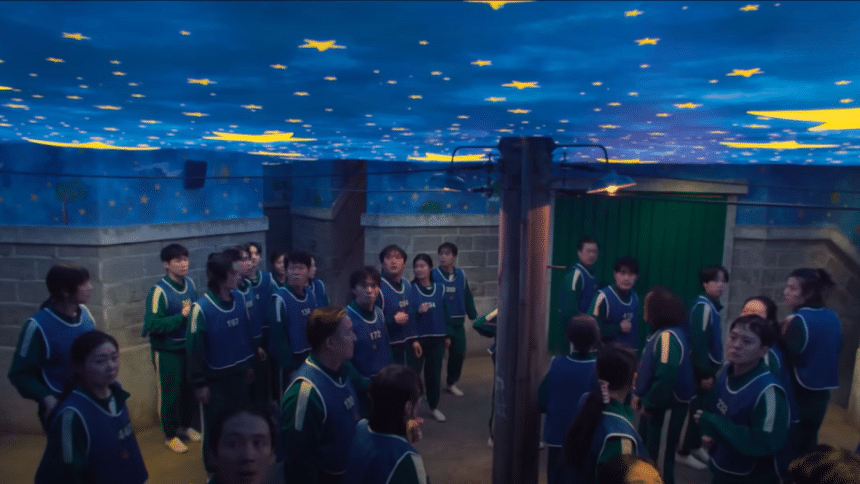‘Squid Game’ Season 3: Utterly humane, utterly devastating

When "Squid Game" first dropped on Netflix in 2021, it became a viral hit. With its dystopian depiction of desperate, debt-ridden individuals playing twisted versions of childhood games for a life-changing cash prize, the Korean survival drama tapped into something raw. Set against the backdrop of global inequality, pandemic-era despair, and capitalism in overdrive, it was a modern parable disguised as a thriller. The tracksuits, the red light/green light doll, the piggy bank of blood money; everything became instantly iconic. But it was the emotional stakes, the betrayals, the unlikely friendships, and the slow unravelling of one man's soul that made it unforgettable.
The show primarily centres around Gi-hun (played with wrenching brilliance by Lee Jung-jae), a divorced father, deep in debt, who joined the deadly competition in the hopes of giving his daughter a better life. Along the way, he formed fragile bonds with other contestants and watched most of them die. The debut season ended with Gi-hun as the sole survivor, who became rich but emotionally shattered. Season 2 followed his willing and vengeful return to the game, this time to take it down from the inside. However, it did not go as planned. The rebellion failed. Allies were lost. And Gi-hun was left with even more blood on his hands. In the last and final season, his saga comes to an end. And remarkably, it does so with clarity, pain, and surprising grace. One would think the show might struggle to keep raising the stakes after two seasons of increasingly high-concept horrific games and shades of humanity, but "Squid Game" does not just go bigger; rather, it goes deeper. This is a final chapter that dares to be muted, dares to grieve, and dares to question what is left of a person after they have survived hell.

There are few things more satisfying than watching a series that knows exactly what it is, where it is going, and how to bring everything home emotionally, narratively, and philosophically. "Squid Game's" last season, in all its brutality, is that rare project with a finale that does not just meet expectations but transcends them. The season picks up right where they left off. Gi-hun begins his journey hollowed out after being the only surviving rebel; he is nearly speechless in the opening episodes, wrecked by grief and self-loathing. In true "Squid Game" glory, the games eventually become bloodier, more merciless, and the stakes are not only monetary but deeply personal. From a deadly round of "Hide and Seek" in a maze of star-painted hallways, to a horrifying twist on "Jump Rope", and finally the mythic "Sky Squid Game"; each round is a spectacle to behold.
But unlike Season 1, where the novelty of these games was the hook, Season 3 treats them as a background factor. The true focus now lies in what happens between the rounds — in the trembling hands before a kill; in the alliances that feel more like confessions; in the mental breakdowns when no one is watching. It is no longer just about survival for money, but survival to preserve what little humanity remains. Despite all of that, this season does not settle for being just a relentless bloodbath. It unfolds with a slower, more contemplative rhythm, allowing characters to breathe and stories to deepen beyond the deadly playgrounds. This shift may throw off those expecting another adrenaline rush, but for viewers willing to sit with the emotional weight, the payoff is extraordinary.

What makes this final season work is not the violence but the intimacy. Gi-hun's return to himself, spurred in part by his promise to protect the newborn daughter of Player 222 (Kim Jun-hee), is one of the most moving arcs in recent television. His final choice, a sacrifice made not to win but to save someone genuinely innocent, is both devastating and thematically perfect. Around him, the supporting cast finally comes into their own. Player 149 (played by Kang Ae-shim), the elderly woman trying to absolve her son's sins, is a standout. So is Yo Ju-ri as the pregnant Jun-hee, whose courage never turns cliché. Even characters who might have felt archetypal in earlier seasons, like Hyun-ju (Park Sung-hoon), the trans ex-soldier, or the morally grey Front Man, are rendered with care. Lee Byung-hun's performance as the Front Man is particularly magnetic: menacing yet melancholy, a man more broken than monstrous.
Of course, not everything lands perfectly. Some narrative threads feel rushed. The betrayal subplot fizzles, the long-simmering sibling conflict between the Front Man and detective Jun-ho never quite reaches its emotional peak, and there is still something cartoonish about the elite VIPs betting on lives like poker chips. Oddly enough, the show seems aware of it all. In one jaw-dropping scene, a VIP echoes a line we have likely thought ourselves; marvelling at the players' moral dilemmas, as if they're reality-show contestants. It is a gut-punch reminder that "Squid Game" has always been a mirror. And in Season 3, it points directly at us, indicating that we watch, we root. we grieve, but we also consume. And in this world of "Squid Game", spectatorship is its own kind of violence.

While the VIPs return as the ostensible puppet masters of the cruelty of the game, and get more screen time, they embody the show's critique of wealth and power. Nonetheless, their caricatured performances and stilted English dialogue often feel jarringly out of sync with the otherwise grounded emotional storytelling. These scenes, intended as biting satire on capitalism and voyeurism, sometimes pull the viewer out of the grim reality unfolding elsewhere, their grotesqueness teetering on parody. Structurally, the season suffers from the awkward legacy of its own expansion. The split across Seasons 2 and 3, which could have been swapped for a tighter single season, leaves parts feeling loose and padded. The momentum dips in places, particularly in exposition-heavy episodes that drag the pace. This unevenness slightly dilutes the impact of the game sequences, which are the show's raison d'être.
Yet, through all the bloodshed and cynicism, this final season holds onto a fragile hope. It may be faint and naïve, but it is there, especially in Gi-hun's final moments. By the end, the show does not offer triumph. It provides calm defiance. A whisper of resistance in a world that wants you to believe resistance is futile. As the credits rolled on that final episode, I found myself devastated but not empty, not even angry, just moved. This season does not promise happy endings, but it does offer humanity. And that, in a show so focused on cruelty and greed, might be the bravest thing of all. "Squid Game" is not just the end of a story, but the culmination of everything it tried to convey. We are not horses; we are humans — we break, bleed, cry, and sometimes, we still choose to care.

 For all latest news, follow The Daily Star's Google News channel.
For all latest news, follow The Daily Star's Google News channel. 








Comments